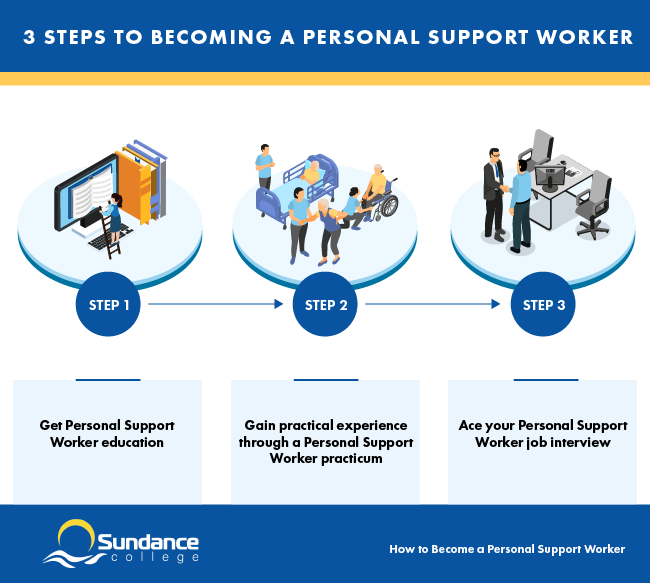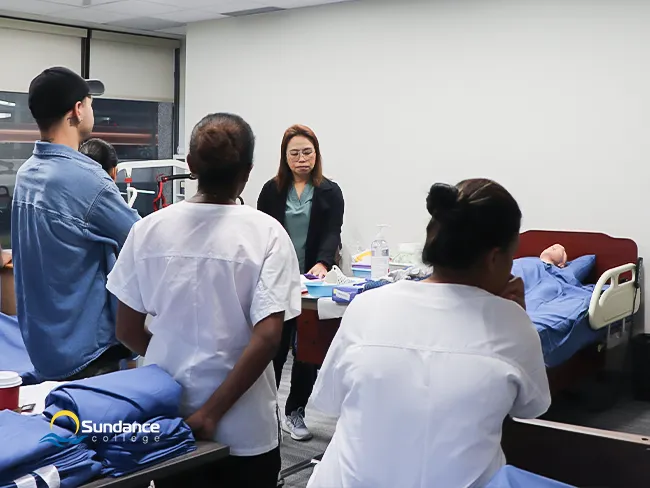Blog / How to Become a Personal Support Worker
How to Become a Personal Support Worker

Personal Support Worker Diploma
- Personal Aide - Home Support
- Family Caregiver
- Personal Support Worker
- Home Support Worker
Table of Contents
To become a personal support worker, begin by acquiring relevant college education. This will equip you with the knowledge and skills necessary to take proper care of patients facing challenges due to age, illness, or disability.
As part of your education, take advantage of a workplace practicum. You can also do volunteer work to gain practical experience. Build a professional network, highlight your strengths in your resume, refine your interview skills, and apply widely.
In this article, we’ll explore these steps in detail to guide you toward a rewarding PSW career.
Listen to “How to Become a Personal Support Worker”
Personal Support Worker Qualifications
To pursue a career as a personal support worker, it’s good to understand exactly what this profession involves, and which qualifications for PSWs will help you succeed:
- Key personal PSW traits: Personal support workers need to bring empathy, patience, and reliability to their work, as they support individuals facing physical and cognitive challenges. Solid physical stamina is also essential, as PSWs often assist clients with mobility, transfers, and daily activities that can be physically demanding.
- Employment requirements can vary depending on the province and employer:
- Home management experience may be required
- Some employers look for candidates with college courses or formal training in home support
- First-aid certification is often requested
- Completion of a training program in elderly care, disability support, convalescent care, or a related field may also be required
- Additional PSW skills for success: Alongside technical skills, qualities like strong communication, adaptability, and a genuine commitment to helping others are important.
This combination of formal skills, personal traits, and physical readiness is key to building trust and providing high-quality care in any setting, whether it’s a private home, a hospital, or a long-term care facility.
How to Become a Personal Support Worker

To get started in this rewarding field, it’s helpful to follow a clear path. The steps to become a PSW include building foundational knowledge, gaining hands-on experience, and preparing for the hiring process.
Here’s a closer look at each step:
Step 1. Get Personal Support Worker Education
The first step to becoming a PSW is enrolling in a personal support worker training program.
A PSW diploma program provides a strong foundation in essential caregiving skills, including health and safety practices, communication techniques, and knowledge of medical conditions. These diploma programs typically include classroom learning and hands-on instruction, preparing you for real-life caregiving situations.
Employers prefer candidates with formal training, so completing a recognized PSW program can boost your qualifications and your confidence.
Step 2. Gain Practical Experience Through a PSW Practicum
Practicum placements are often included as part of PSW training programs and provide an invaluable opportunity to gain practical experience.
Under the supervision of experienced professionals at your practicum location, you’ll work directly with clients who need support. This experience helps you put your classroom knowledge into practice, develop essential skills, and understand the day-to-day demands of a PSW role.
Practicum placements also offer a chance to build connections within the field, which can be beneficial when seeking employment after graduation.
Step 3. Ace Your PSW Job Interview
After completing the first two steps, you’ll be ready to begin your new career as a personal support worker. But first, you’ll need to prepare for and succeed in the job interview. Here are some tips to help you make a strong impression:
- Tailor your resume: Highlight relevant skills like patient care, communication, and problem-solving, focusing on experiences from your practicum.
- Practice interview questions: Prepare for questions specific to the PSW role, such as handling challenging client behaviours or managing a heavy workload. (For more tips, check out our blog on essential PSW interview questions!)
- Showcase your dedication: Emphasize your commitment to caregiving and how your education and hands-on experience have prepared you to provide compassionate support.
Applying to various positions, both in-person and online, can boost your chances of securing the right PSW role for you.

Benefits of Becoming a Personal Support Worker
Once you know what it takes to become a PSW, let’s add a dose of motivation by exploring the rewarding benefits of the personal support worker career path:
- Make a difference: Working as a PSW in Canada allows you to make a positive impact on your clients’ quality of life by fostering independence and improving their daily experiences.
- Fulfillment and connection: This role can be highly fulfilling, as it involves creating lasting bonds with those you care for.
- High demand: PSWs are in high demand across Canada, primarily due to an aging population, 92% of whom wish to remain in their own homes. This demand offers job security and a wide range of employment options.
- Flexible work options: Working as a PSW can provide flexibility with work hours, as both part-time and full-time roles are commonly available. Many positions offer opportunities for overtime as well, which is ideal for those seeking adaptable schedules or additional income.
Choosing a PSW career means stepping into a stable and in-demand field that allows you to make a real difference while enjoying practical job benefits.
How Long Does It Take to Become a PSW?
The timeframe to become a personal support worker is relatively short compared to many other healthcare careers.
It typically takes approximately 10 months to complete a PSW diploma program in Canada. These programs cover the essential skills needed for caregiving and often include a practicum, allowing students to gain hands-on experience before entering the field.
Factors such as part-time or full-time study and the specific requirements of each program can affect how long to become a PSW. Some students may also choose to volunteer or work part-time in caregiving roles to build experience while completing their education.
How a Personal Support Worker Diploma Can Help You

Personal Support Worker diploma from Sundance College is an invaluable step toward your successful caregiving career.
In just 43 weeks (around 10 months), you’ll gain in-depth training, including a 7-week practicum — giving you more hands-on experience than most colleges offer. Through specialized personal support worker labs at our Edmonton and Calgary campuses, you’ll develop practical skills in real-world scenarios, so you’re well-prepared to support clients with diverse needs.
With this comprehensive program, you’ll be confident and fully equipped for becoming a PSW in Ontario, British Columbia, Alberta, or anywhere in Canada — all in under a year!
To apply, fill out this form.
Related Blogs
Subscribe for more career advice
Blog Categories
Share on:
